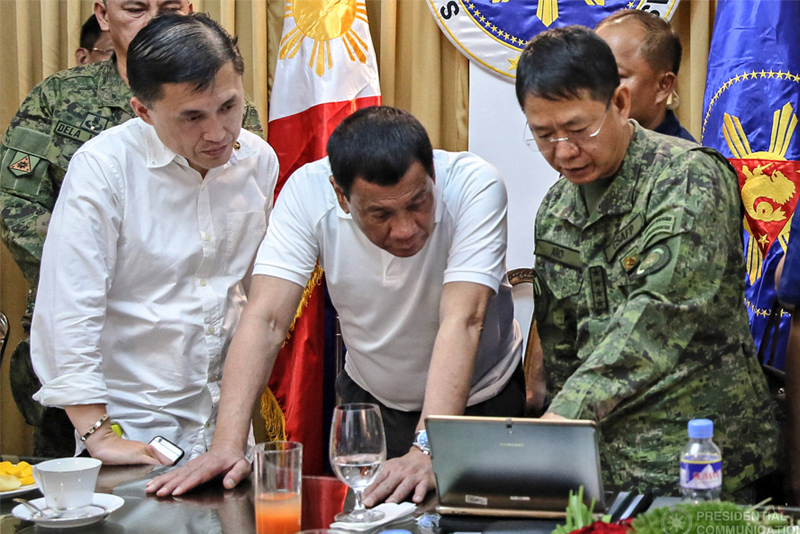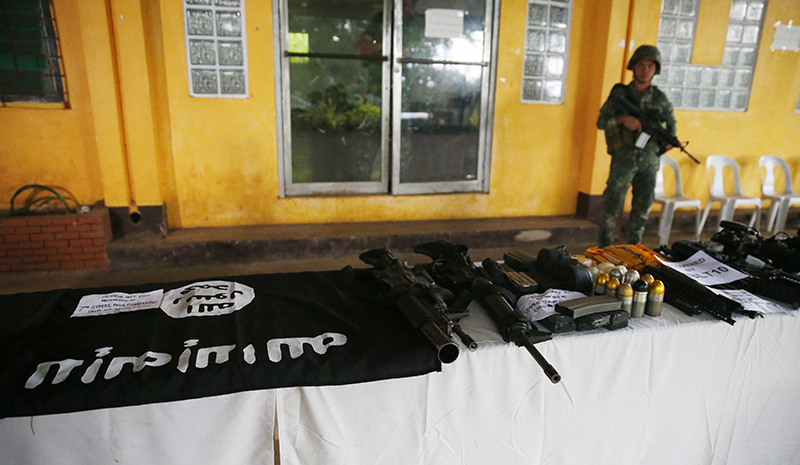With 90% of Marawi retaken, gov't vague about lifting martial law

President Rodrigo Duterte views a presentation by Gen. Eduardo Año, Armed Forces of the Philippines chief of staff, on developments on the terror crisis in Marawi City during a meeting in Davao City on May 29, 2017. With them is Special Assistant to the President Bong Go. PPD, file
MANILA, Philippines — State forces have retaken 90 percent of Marawi, the besieged capital of Lanao del Sur province, but President Rodrigo Duterte's government is not eyeing the lifting of martial law soon.
Brig. Gen. Restituto Padilla, military spokesperson, said reports from the ground estimate that only 10 percent of the city remains in the clutches of the Maute terror group and allied gunmen.
"However, that 10 percent is most likely going to the area that will be heavily guarded and defended by these armed men if they are protecting any individual of high value," Padilla said at a televised press conference.
The armed forces still suspect that Abu Sayyaf leader Isnilon Hapilon, for whom the United States has a $5 million bounty, is still being protected by the Maute in Marawi.

A Philippine Marine guards the display of recovered high-powered firearms, ammunitions, uniforms and black ISIS-style flags which were shown to reporters Tuesday, May 30, 2017 in Marawi City in southern Philippines. AP/Bullit Marquez
While an end to the fighting is possible in the coming week, government's vague terms suggest there is no end yet in sight for the imposition of martial law in Mindanao.
Echoing Duterte's statements, the Department of Defense said on Wednesday that "martial law is imperative to once and for all address security concerns in the entire Mindanao immediately and decisively."
It said these concerns refer to the threats posed by local terrorists linked to the Islamic State. It also claims that the network of the ISIS, a Middle East-based terror organization, covers the "entire Mindanao."
Deputy Executive Secretary Menardo Guevarra, moreover, told the House of Representatives on Wednesday morning that "public safety necessitates continued implementation of martial law in Mindanao" despite the military's report that the clash in Marawi is winding down.
Duterte's declaration of martial law last week was supposedly in response to the Marawi attack, but experts and even a foreign government have long warned of the threat of homegrown terror groups in Mindanao pledging allegiance to the so-called Islamic State since last year.
Congress, which has the power to review and reject martial law by a vote in joint session, has opted instead for closed-door briefings on the situation. The Senate on Tuesday rejected a call by a handful of senators to hold a joint session.
Martial law to heal Mindanao's ills?
Suppressing extremism and its violent tendencies in Mindanao through martial law has also been questioned by those who have long studied problems in the troubled south, areas of which remain the poorest in the country.
"I doubt if the 60-day martial law in Mindanao is enough time to fix the problem of extremism," Julkipli Wadi, professor at the Institute of Islamic Studies, said last week.
ALSO READ: A look into Duterte's reasons for martial law in Mindanao
While the botched raid, subsequent firefight and the siege attempt it sparked in Marawi have stoked fears that the groups are aiming to establish an ISIS "wilayah" or province in Mindanao, assessment of the strength of the Abu Sayyaf and Maute play down the possibility.
Joseph Franco, who specializes in counterinsurgency and counter-terrorism, said that Filipino militants such as the crime group Abu Sayyaf do not have the ideological commitment to be identified with the ISIS, much less the capability to seize and govern areas for consolidation under the so-called caliphate.
With the ISIS focused on the Middle East and countering US advances, the group's priorities in Southeast Asia have been doubted, Franco added.
The threat of terrorism in Mindanao, for Duterte and his officials can be addressed under martial law, but the problem goes beyond military means, as it is rooted in deep seated socio-economic realities in Mindanao.
"Armed conflict in Mindanao is a volatile mix of clan networks, political rivalries and the utilitarian use of religious narratives rooted in the history of the region," Franco wrote in a paper published by the East Asia Forum in April.
"The idea of an IS caliphate is unlikely to perish with the retaking of Mosul and Raqqa. But the physical manifestation of the IS vision requires a confluence of history and socio-economic realities. It is irresponsible to assume that an illicit institution could be transplanted from the plains of the Levant to the jungles of Mindanao," he added, referring to ISIS strongholds in Iraq and Syria.
Rather than addressing terrorism, martial law may even worsen the weak rule of law in the country, said Zachary Abuza, professor at the National War College in Washington.
"Where is his overall comprehensive strategy for peace? I don't see anything but a bunch of knee-jerk reactions, and a shoot from the hip approach. He has no holistic approach I see (the Marawi clash) as nothing more than a pretext to declare martial law.," Abuza told Philstar.com. — Video by Efigenio Toledo IV
- Latest
- Trending


























